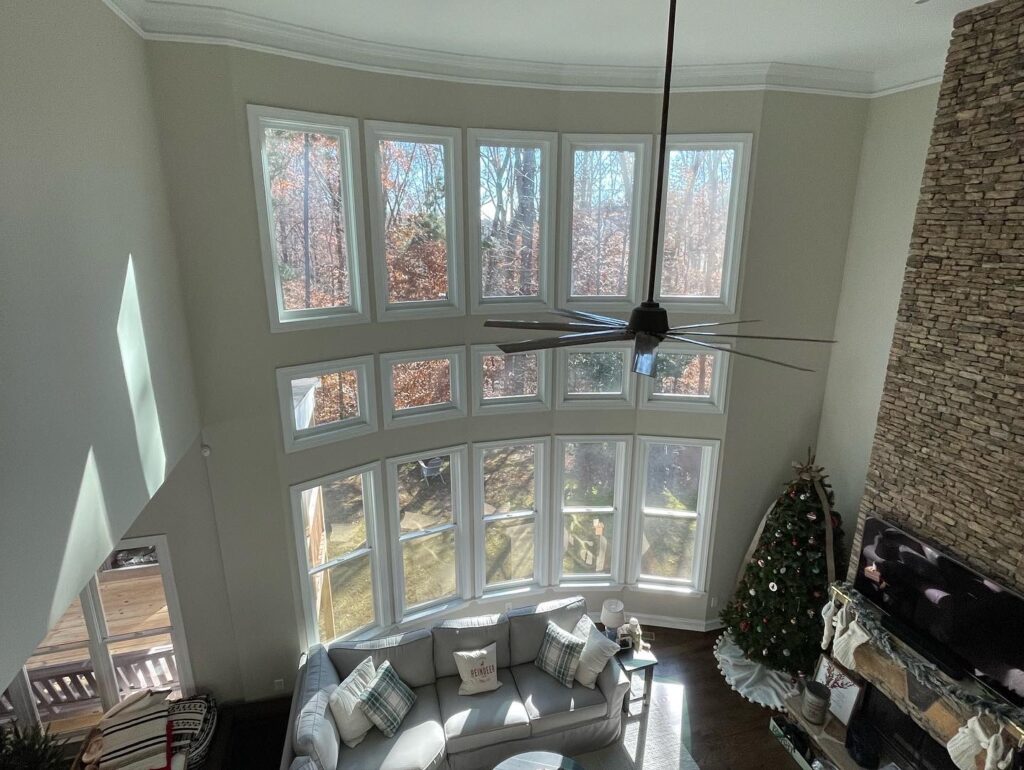Window tinting is great for summer as it helps in various ways. But is it helpful for other seasons like Winter? This is a common question among consumers looking to get their windows tinted. In the summer, window films reduce the heat entering our buildings. On the other hand, winter is different, and people want the interior of their homes or business to be warm. So, here’s the question: “If window tinting is suitable for Summer, can it help in the Winter as well? Can window tinting help in conserving heat during the cooler months? Here, Tennessee Film Solutions discusses whether window tinting is helpful during the Winter and how it can conserve heat.
Does Window Film Help Conserve Heat?
The simple answer is, YES! It is a fact that window tinting can help in winter to conserve heat and keep your house warm. Window films have the heat retention ability that reduces energy loss and saves the heat gained through solar light, keeping that heat inside your home or business. Window tinting is an excellent option for both summer and winter as it helps keep the house cool in summer, and in winter, it helps in heat retention, helping you save a lot on utility bills.
Types Of Window Film
Before discussing how window films can help conserve heat, let’s first discuss the different types of window film:
- Tinted Window Film – You might be familiar with these films as they are the staple for commercial and residential buildings. These films are quite the most popular window films and are available in various tint percentages and designs. You can choose the film according to your preference, as it gives you the flexibility to decide how much light to want to block.
- Low-E Window Film – If you want a window film that will conserve energy in the Winter and Summer, this is the film for you. These window films are designed keeping in mind modern-day needs and are best for energy conservation and reducing energy costs. With their innovative design and energy-saving ability, these are perfect for every season.
- High Reflectivity Window Films – These window films are quite dense and are mirror-like films that are great for blocking excess sunlight and reducing light glares. These are not the best choices for energy conservation purposes, but if your priority is blocking sunlight, they are the best for that purpose.
How Window Tinting Can Help During The Winter
- Insulation Of Your Home
Residential window tinting can act as an insulator, as glass windows alone cannot properly insulate your homes. Glass is a terrible insulator, and you can feel the difference both in summer and winter. But if you want proper insulation, adding another layer of window film can help. Window film can insulate your home by trapping the heat inside your home and preventing the cold from entering your house.
- HVAC Efficiency
Window tinting can significantly reduce the overworking of your HVAC system and increase efficiency by dividing the workload. No matter how excellent your HVAC system is, when it is overworked, its efficiency will start to reduce. This is even more prevalent on cold Winter days when it’s running to keep your home or business warm. Window tinting divides that workload by working with the HVAC system, conserving the heat energy inside the house and keeping the warmth inside. Less workload means an increase in the shelf life of the HVAC system.
- Reduction In the Fading of Furniture
About 90-95% of the rays entering your house are ultraviolet, comprising both UVA and UVB. UV rays are quite harmful not only to your health but also to your furniture as it causes premature fading of your furniture, making it dull. Don’t worry; residential window tinting is the solution to this problem, as it reduces the UV rays entering your building. As we mentioned, for blocking sunlight, different films work differently. So consult a window tinting service like Tennessee Film Solutions and ask for suggestions on which window film will work best for you.
- Lesser Heat Loss
With the application of window films, rooms will lose the heat energy gained from the solar light at a much slower rate. That is, if you have big glass windows in your home, keep in mind that glass is a great conductor of heat. It immediately loses heat and is a good medium for cold temperatures. But the window film on the glass makes it more difficult for the cold to get it, whereas the indoor heat escapes slower. With warm air retained inside your home for longer, you are bound to save a good amount on your utility bills.
- Reduction Of Glare and UV Light
As the day passes, you will see various windows of your house emitting sun glare. Glaring windows can affect work productivity, so if you are a work-from-home type, you should consider window tinting. Aside from reducing glare, window tinting can also help prevent UV rays. As we mentioned before, UV rays are harmful to both your health and your home. Talking about health, these rays can cause skin problems like skin cancers. Additionally, eye problems like eye macular degeneration, cataracts, and corneal damage. Residential window tinting does an excellent job of preventing these rays from entering the house, saving you from any health problems.
Looking For A Professional Window Tinting Company? Call Us Today!
Residential window tinting is beneficial during the Summer and Winter. No matter what season it is, these window films provide numerous benefits, from saving you money to your health.
Tennessee Film Solutions is the only professional tinting service you will need in the state of Georgia. Whether it is commercial tinting or residential window film for your home, our professional team can get the job done efficiently. Give us a call today for more information on pricing and installation availability. We look forward to hearing from you!


